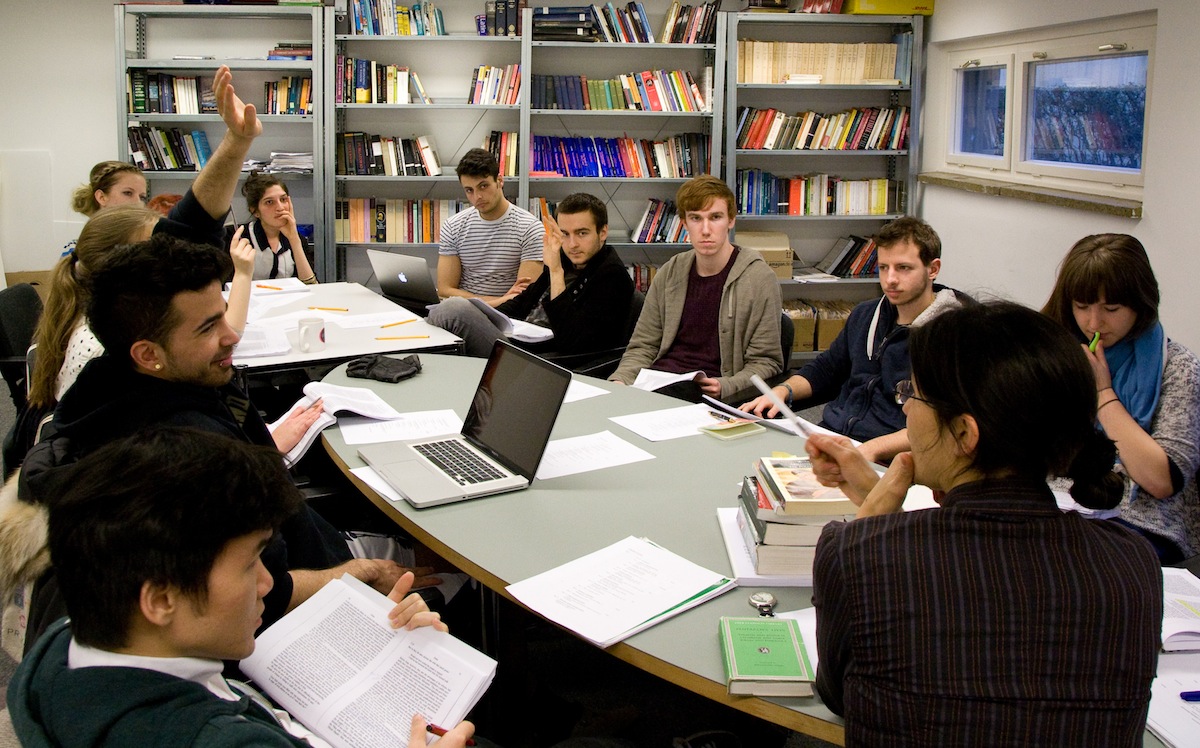
Seminar at Bard College, Berlin
Photograph Attribution: Irina.Stelea, CC BY-SA 3.0 <https://creativecommons.org/licenses/by-sa/3.0>, via Wikimedia Commons
Our Independent Study program is new. If you'd like to give it a try, contact Tom Price at This email address is being protected from spambots. You need JavaScript enabled to view it..
Participation with our pilot program would necessarily involve a college professor to sponsor a student or group of students. Similar to our basic team structure, the Review Team would be comprised of the professor would serve in the role of Sr. Reviewer and the student(s) would fill the role of Reviewer(s). To get started, email a copy of this article to your professor (see "email" option on the pulldown button on the upper right side of this view) to inquire if they would be interested in sponsoring a review.
For example, a student(s) may earn college credits by conducting one to three document reviews per term by working with the professor by following our review process. A Review Coordinator with the Environmental Review Workshop will be assigned to interface with the Independent Study Review Team. The first step is to find a document which is open for pubic consultation. To locate one for your region, check out our directory of public comment periods on the state level at: http://www.envreview.org/index.php/directory-of-public-comment-periods . There is no waiting period, you can start looking for a document to review right away!
Once a document is selected, the Review Coordinator will explain our workflow process, review checklist, and roles of participants and send a "Review Kickoff" email. That template follows:
Dear <Professor and Student(s)>:
Thank you for joining the Review Team, members include Sr. Reviewer <Professor> and Reviewer <Student(s).
On <date> Comments are due for review of: <project name, regulatory agency hosting the comment period, and Link to view documents available for public consultation>
I’m pleased to introduce the team members:
<biopics for all participants>
Please adapt this review to follow our workflow process as described below. Most of our reviews involve a Sr. Reviewer and a Reviewer and are about three weeks in duration but you can adapt roles and timeframe as needed:
Week 1:
· We encourage the Sr. Reviewer to lead the review by identifying and sharing topics which are considered viable for commenting. The Sr. Reviewer is encouraged to provide direction for preparation of comments on those viable topics to draw out the comments from the Reviewer.
· The Reviewer identifies topics too, esp. from the review checklist shown on our website at http://www.envreview.org/index.php/educational-articles/219-cheat-sheet-for-environmental-reviews-12-13-20 .
· Initially the Reviewer is tasked with emailing the contact person with the agency that is hosting the public comment period to inquire if the agency will respond to comments we provide (a major challenge we face is receiving feedback on our comments).
· However, if viable topics are not identified by the Review Team by the end of the week, the review should be discontinued.
· A weekly meeting or communications should occur during this period.
Week 2:
· The Reviewer prepares draft comments (Draft version), and those are sent to the Sr. Reviewer for markup. We suggest that the markups should draw out comments by suggesting edits on the Draft version that are "halfway" to, and direction toward a professional work product (to enhance learning and not “steal the thunder”). We refer to the versions as Draft, Draft Final, and Final which is useful for tracking status.
· The markups are provided for preparation of a Draft Final version (through one or more iterations).
· A weekly meeting or communications should occur during this period.
Week 3:
· The Reviewer provides a Draft Final version of the comments to the Sr. Reviewer for final editing and approval.
· The Reviewer is tasked with submitting the approved Final comments to the regulatory oversight agency. Signature blocks for all contributing Review Team members are shown on the Final version.
· A weekly meeting or communications should occur during this period.
· The Reviewer is tasked with uploading the comments to our website as an article in their portfolio (instructions will follow after comments submission).
· Review closeout - each review participant is requested to report the time spent on the review (this information is needed to support our grant writing efforts), and may provide feedback and suggestions for process improvement.
Technical support may be provided upon request to the Review Coordinator, for an experienced Sr. Reviewer within the area of expertise of the review to provide comments or join the Review Team.
Please confirm receipt asap by starting an email correspondence.
· <Student(s)> please tell us about your interest in selecting this review?
· <Professor> please tell us about your interest in sponsoring this review?
After that you don’t need to cc me on all of your emails, but please keep me apprised of your progress. Also, please feel free to contact me with any questions or if clarifications are needed. Good luck on your review!
Thank you, Review Coordinator – Environmental Review Workshop (Environmental Review, Inc., a 501(c)(3) Nonprofit Public Benefit Organization), www.envreview.org